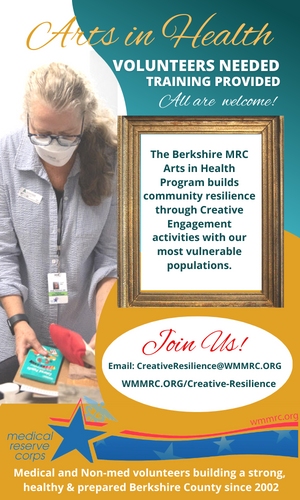There are FOUR cardinal rules of MRC Deployment:
- The MRC Unit is only deployed through a request to the Unit Coordinator/Director.
- Volunteers should NEVER self-deploy. This is for the safety of all. Self-deployment is grounds for dismissal.
- No unauthorized person should ever deploy individual MRC volunteers directly.
- Students should only be deployed under the supervision and guidance of licensed professionals.
To learn about the stages and process of MRC Deployment, as well as your rights and responsibilities as an MRC volunteer who is deployed, see our Policy and Procedure Manual.
Memorandum to Western Region Homeland Security Advisory Council
December 20, 2011
The Medical Reserve Corps (MRC) in region 1 (western MA) consists of 17 MRC units out of the 45 MRC units statewide. The national Medical Reserve Corps program offices are housed under the jurisdiction of the US Surgeon General. Medical Reserve Corps units are member of Citizen Corps.
MRC deployments in 2011 included early winter snowstorms, June 1, Tornadoes, Micro bursts, Tropical Storm Irene and a federally declared October snowstorm disaster.
Prior deployments: Ice Storm 2008, H1N1 pandemic, November 2010 child gone missing, propane tractor trailer truck explosion, water contamination, multiple annual board of health sponsored flu clinics).
Core trainings:
- MRC 101 Introduction to MRC, policies and procedures, personal and family preparedness. Core Competency guidelines for MRC Volunteers.
- ICS 100/NIMS 700 online or in a class
- Psychological First Aid – conducted by nationally certified instructors
- Also, various training videos and links on the website: www.wmmrc.org
- CORI/SORI
We are relatively new (established in our region with pilot in 2003, with county coordinators brought on-board in 2007 with a few units and DART coming “on-board” in the past two years)
MRC are under-resourced yet have been highly effective responding to three large scale and lengthy deployments. Volunteers were also victims in the tornado, floods and snowstorms that shut the region down. >5,000 hours staffing two urban shelters; 24 X 7 X 30 days with the tornadoes; staffed Irene shelters and deployed DART teams; staffed (most) shelters in the region with the snowstorm from local/regional resources (as other areas across the state were impacted as well).
MRC needs public relations/publicity from our partners (in the context of strengths / lessons learned).
We are here, we have finite capacity, we need the components/disciplines that comprise WRHSAC to bring us into your planning, exercise and training and decision making. Co-exercising at times that fit volunteer schedules.
MRC requires realistic, real time assessments of assets….not promises….numbers. For example, if a regional shelter is being opened MRC must be consulted as to the real-time capacity to staff. We were staffing shelters across Hampden County with MRC volunteers without power themselves (many who were able left the region to stay elsewheres) and ARC called me for MRC staffing at Chicopee Regional. This was not an request that was expected. If ARC was only staffing one shelter could they not handle just one…..as it turns out Chicopee MRC was engaged throughout the shelter operations.
MRC is requesting that the regional leadership organize a roundtable discussion on sheltering between key players: MEMA, EMDs, EMS, public health, Hospitals, Volunteer partners (ARC, MRC, CERT), municipal officials for a facilitated discussion on roles and steps to educate public (expectation management).


